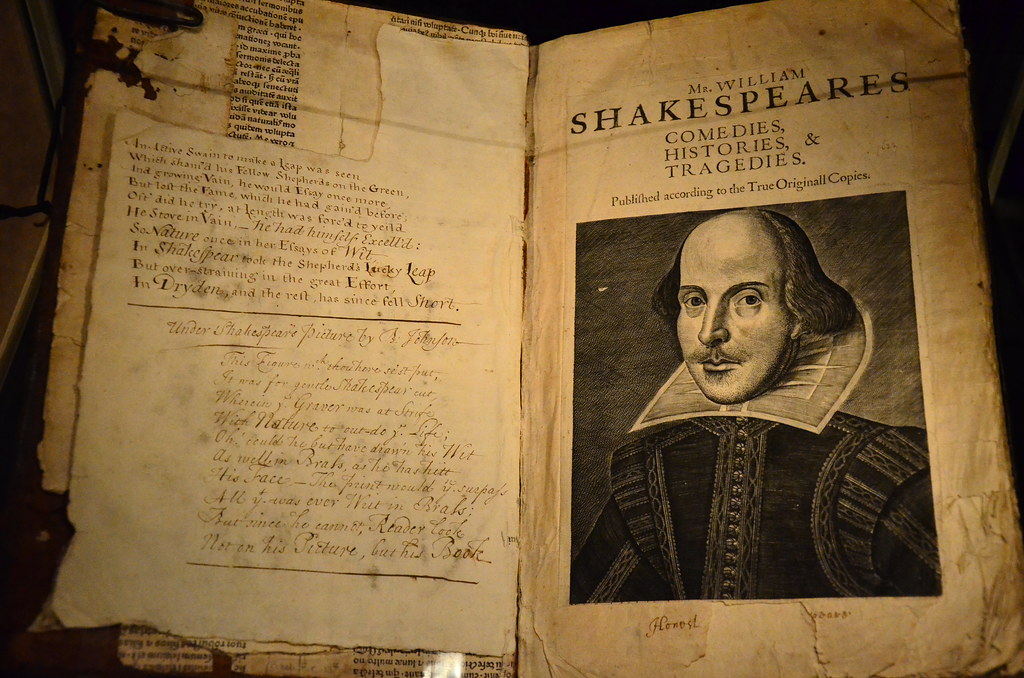300-year-old Shakespeare Folio collection set to sell for millions at auction
On May 23rd, four of Shakespeare’s folios are to be put up for auction as a set, expected to go for £3.5 to £4.5 million. The set includes a First Folio, a Second Folio, a Third Folio, and (as you might’ve guessed) a Fourth Folio. But what even is a folio? And whilst we’re at it, why are these books going for the prices of mansions?
Folios are larger, taller volumes and were typically thought to be more important and higher status than quartos
When Shakespeare’s plays were originally published in writing, about half were published individually or separately to the First Folio, in what was called a quarto. That means bookmakers would print eight pages of text and then fold them into quarters, bind the folded pages and slice them, so that every one of the original eight pages would then make eight more. Folios are larger, taller volumes and were typically thought to be more important and higher status than quartos.
In 1623, after Shakespeare died, some of his colleagues compiled Mr William Shakespeare’s Comedies, Histories & Tragedies, or, the First Folio. It became the only reliable source for about 20 of Shakespeare’s plays, such as The Tempest and Macbeth. As far as we know, the folio includes most of his plays, but there are definitely two lost ones: Cardenio and Love’s Labour’s Won, which are known to have been performed by Shakespeare’s theatre troupe, the King’s Men, and were written at least in part by Shakespeare. However, some people believe that the latter might be an alternate title to another play, or a sequel to Love’s Labour’s Lost.
After the First Folio came a second, third and fourth. Whilst the first might be the most valuable, the third is the rarest, with only 182 copies in existence compared to 235 First Folios. This is thought to be because a lot of stock would have been destroyed in the Great Fire of London.
Jumping ahead to the 19th century, Shakespeare and his works were made emblematic of British national pride and even power, taught in schools all across the British Empire
In its day, the first 750 copies would have cost around £100 to make, and the first recorded purchase was to Edward Derling, who bought two folios for £2. This is a far cry from the £2 million one of the First Folios went for in 2022. The key difference now being, of course, Shakespeare’s undeniable legacy.
In 1598, Shakespeare was credited with his first work, which, as it happens, was Love’s Labour’s Lost. The following year, his theatre company had their own theatre, the Globe, built for them. Jumping ahead to the 19th century, Shakespeare and his works were made emblematic of British national pride and even power, taught in schools all across the British Empire. The man is credited with the invention, or introduction at the very least, of over 1500 words into the English language – meaning without his plays and the First Folio, we wouldn’t have on record hundreds of English words. This spans ‘addiction’ to ‘suspicious’ to ‘pajock’ – the last of which I’ll admit I don’t tend to use in everyday conversation.
Shakespeare’s explorations of love, greed, grief, and power have stood the test of time
Then, even if you aren’t a literature student foaming at the mouth for some good Shakespeare, you probably still encounter his legacy on a daily basis. Not only did he and his work influence the language we use, but also tropes and stories we’re familiar with. We’ve seen Shakespearean readaptation after readaptation; retelling after retelling in on-stage performances, film, TV, and literature. I didn’t realise until quite recently that The Lion King is based on Hamlet, and the list does indeed go on, notably, in the romantic comedy genre. Whose favourite romcom isn’t 10 Things I Hate About You or She’s The Man? If you’re partial to either, you’re indebted to the First Folio, as both The Taming of The Shrew and Twelfth Night were published for the first time there. Luckily, we’d still have Anyone But You, one of our new Shakespearean romcoms loosely based on Much Ado About Nothing, but I think I’d rather have the other two. At any rate, Shakespeare’s comedies being built on miscommunications probably appeals hard to the romcom and its audience, as this user points out.
Shakespeare’s explorations of love, greed, grief, and power have stood the test of time; year 9s all around the country are probably being forced to recite lines from Macbeth as you read this. I’m not sure if we’ll ever know for sure that Shakespeare was the mastermind and wordsmith of the Elizabethan era. Maybe he’s just the one who had the most physical texts survive. Nevertheless, his colleagues certainly didn’t immortalise him in his work for no reason because book-making was expensive back then. But given all that the First Folio has done for English language and culture, I can’t help but be grateful that they did.

Comments